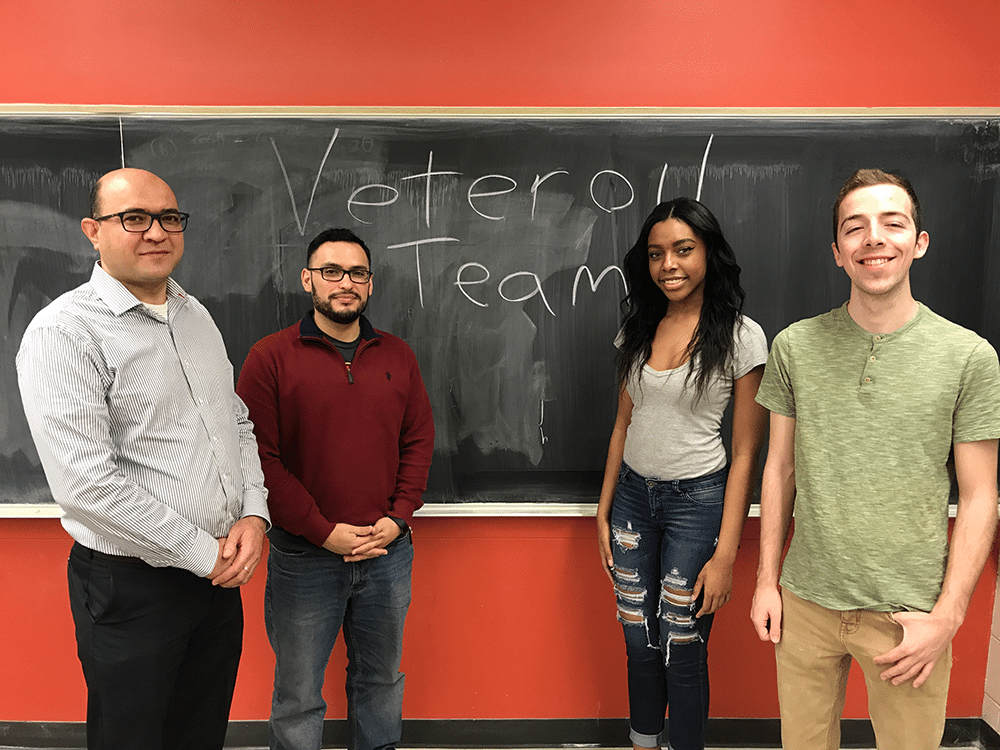HFC Students are in the Top 10 Finals at this year’s Community College Innovation Challenge

The National Science Foundation (NSF) – in partnership with the American Association of Community Colleges (AACC) – announced that Henry Ford College (HFC) is one of 10 finalists for this year’s Community College Innovation Challenge (CCIC). This is the third consecutive year HFC has been named a Top 10 finalist in the CCIC.
The three HFC students – Breanna Allen, Will O’Connell and Hector Ochoa – will receive a trip with all expenses paid to participate in an Innovation Boot Camp at the NSF headquarters in Arlington, VA from June 12-15.
Innovation Boot Camp is designed to provide a hands-on learning opportunity for the 10 finalist teams – including the one from HFC – to further develop their ideas/innovations through workshops and technical assistance focused on building innovation, entrepreneurship and strategic communication skills as they propose solutions to perplexing real world problems.
The HFC team’s project is called “Veteroil: An Alternative Form of Yard Waste.” Each year, approximately 200 million tons of yard waste fills landfills across the United States (U.S.). This costs cities $7.3 billion per year. The team has proposed an innovative and inexpensive method for extracting energy from yard waste, calling the end-product Veteroil, which is a bio-fuel.
By trashing less waste and reducing greenhouse gases by replacing fossil fuel with Veteroil, the team estimates that cities could save significantly by reducing yard waste disposal costs. The team conducted several experiments, discovering that Veteroil has:
- Low activation energy;
- Low pollution release;
- High flame temperature; and
- Low amounts of leftover ash.
Veteroil conserves natural resources, spares acreage reserved for landfills, and saves money spent on the production of fuel. Ethane, propane, and butane are environmentally hazardous gases currently used as external energy sources. Introducing Veteroil as a residential and commercial source of energy will eliminate the need for extracting and processing these unsecure sources of energy. Substituting fossil fuels with Veteroil will reduce the amount of greenhouse gases. Furthermore, decreasing the amount of greenhouse gases emitted into the atmosphere decelerates the effects of global warming and helps prevent deterioration of the ozone layer.
Extracting energy from yard waste reduces the cost associated with the production of fossil fuels. Aside from production, fuel importation has exorbitant costs and contributes to the depletion of the natural resources on a global scale. By reducing the need for outside fuels, Veteroil serves to cut expenses associated with importation. Substituting detrimental energy sources with Veteroil will decrease costs and leave a lasting positive impact on our environment.
“Municipalities can save thousands of dollars in reduction of disposal,” said Allen.
According to Hassan Mohseni Nameghi, HFC’s Pre-Engineering faculty coordinator, the three students collaborated with its community partner the Wayne County Dept. of Public Services – Land Resource Management division in developing this project. The team is currently seeking investors to commercialize Veteroil.
“Innovation is our job here at HFC. We inspire creativity in our students. We challenge our students to be come up with an idea and build it,” said Nameghi.
More than 40 percent of undergraduate students are enrolled at community colleges throughout the U.S. Groups underrepresented in the fields of science, technology, engineering and mathematics (STEM), as well as first-generation college students make up a significant portion of students on community college campuses. NSF-funded projects at community colleges support STEM students transferring to four-year colleges as well as receiving education and training to become part of the high-tech workforce, including fields as diverse as biotechnology, cybersecurity and advanced manufacturing.
Knowing the creative potential of these students, the NSF invited teams of community college students to identify key problems and propose innovative solutions in areas with potential for solving some of America’s most daunting challenges: big data, infrastructure security, sustainability (including water, food, energy, and environment) and broadening participation in the STEM fields.
Innovation Boot Camp furthers the NSF’s mission by enabling students to discover and demonstrate their ingenuity to use science to make a difference in the world and transfer knowledge into action. It also furthers the benefit of incorporating research into the traditional teaching mission of the community college.
“The three students involved in this project are very successful students. They’re critical, creative thinkers who are hardworking and persistent. They have no fear of failure,” said Nameghi.
To see video of the students’ project, go to https://youtu.be/GxNGDd8tvbI.